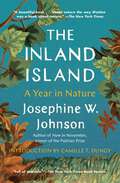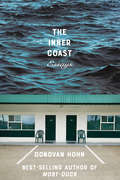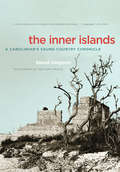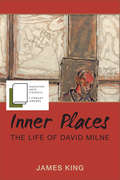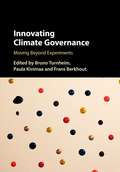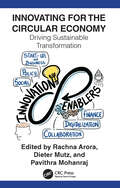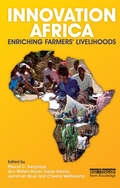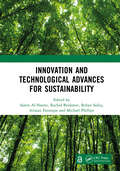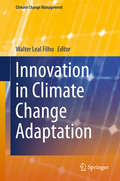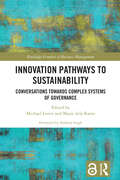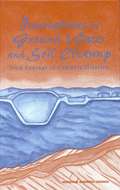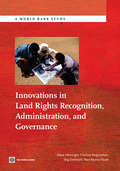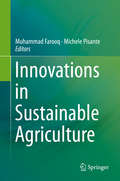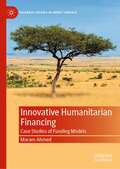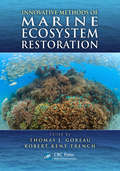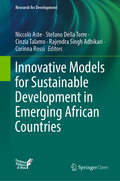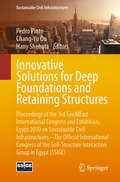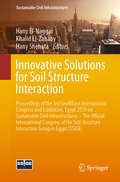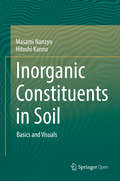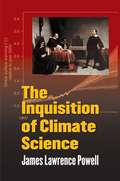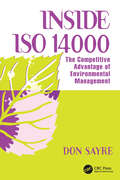- Table View
- List View
Inkling
by Sydney Smith Kenneth OppelThe Rylance family is stuck. Dad's got writer's block. Ethan promised to illustrate a group project at school—even though he can't draw. Sarah's still pining for a puppy. And they all miss Mom. So much more than they can say. <P><P>Enter Inkling. Inkling begins life in Mr. Rylance's sketchbook. But one night the ink of his drawings runs together—and then leaps off the page! This small burst of creativity is about to change everything. <P><P>Ethan finds him first. <P><P>Inkling has absorbed a couple chapters of his math book—not good—and the story he's supposed to be illustrating for school—also not good. But Inkling's also started drawing the pictures to go with the story—which is amazing! It's just the help Ethan was looking for! Inkling helps the rest of the family too—for Sarah he's a puppy. And for Dad he's a spark of ideas for a new graphic novel. It's exactly what they all want. It's not until Inkling goes missing that this family has to face the larger questions of what they—and Inkling—truly need. <P><P>Kenneth Oppel has given us a small masterpiece of middle-grade fiction. Inkling is funny and fizzy and exciting, and brimming with the kind of interesting ideas and dilemmas that kids will love to wrestle with. And Sydney Smith has created wonderfully inky illustrations to bring the story to vivid life. Get ready. A little ink blot is about to become your new favorite character!
Inky Odds
by L. Ron HubbardStep back in time with this thrilling tale. Bat Conroy of World Press is the best news correspondent covering the Japanese invasion of China. But now it's his legendary reputation of getting the story first that's under serious attack. No matter how fast he files his war pieces, Bat ends up being scooped by Perry Lane of International Service, a reporter he's never seen near the fighting (or anywhere, for that matter). When the biggest story of the war comes Bat's way, he's given an ultimatum: outwit Lane and somehow get his story in first or be blackballed from ever working as a reporter again. Before his boss can fire him, Bat sets out to track down his enterprising competitor, little knowing that the real identity of the mysterious newshound is uncomfortably close to home! "Riveting cliff-hanger action." --Midwest Book Review
The Inland Island: A Year in Nature
by Josephine Johnson&“A beautiful book...about nature the way Walden was a book about nature. It should be read by everyone who still retains the capacity to feel anything&” (The New York Times). Stunningly written and fiercely observed, a new edition of a classic work of nature writing about a year on an Ohio farm, by Pulitzer Prize–winning author Josephine Johnson.Originally published in 1969, The Inland Island is Josephine W. Johnson&’s startling and brilliant chronicle of nature and the seasons at her rambling thirty-seven-acre farm in Ohio, which she and her husband reverted to wilderness with the help of a state forester. Over the course of twelve months, she observes the changing landscape with a naturalist&’s precision and a poet&’s evocative language. Readers will marvel at the way she brings to life flashes of beauty, the inexorable cycle of growth and decay, and the creatures who live alongside her, great and small. A forerunner of iconic American women nature writers and a champion of civil rights who marched in Washington against the Vietnam war, Johnson intersperses these &“delicate marvels&” (The New York Times) with profound reflections about racial inequality, urbanization, social justice, and environmental destruction that speak powerfully to our time. Ready to be rediscovered by a new generation, The Inland Island is a vital and relevant meditation on nature and time, capturing the wonder, beauty, hope—and flaws—of our turbulent world.
The Inner Coast: Essays
by Donovan HohnPrize-winning essays on our changing place in the natural world by the best-selling author of Moby-Duck. Writing in the grand American tradition of Annie Dillard and Barry Lopez, Donovan Hohn is an “adventurous, inquisitive, and brightly illuminating writer” (New York Times). Since the publication of Moby-Duck a decade ago, Hohn has been widely hailed for his prize-winning essays on the borderlands between the natural and the human. The Inner Coast collects ten of his best, many of them originally published in such magazines as the New York Times Magazine and Harper’s, which feature his physical, historical, and emotional journeys through the American landscape. By turns meditative and comic, adventurous and metaphysical, Hohn writes about the appeal of old tools, the dance between ecology and engineering, the lost art of ice canoeing, and Americans’ complicated love/hate relationship with Thoreau. The Inner Coast marks the return of one of our finest young writers and a stylish exploration of what Guy Davenport called “the geography of the imagination.”
The Inner Islands
by Bland Simpson Ann Cary SimpsonBlending history, oral history, autobiography, and travel narrative, Bland Simpson explores the islands that lie in the sounds, rivers, and swamps of North Carolina's inner coast. In each of the fifteen chapters in the book, Simpson covers a single island or group of islands, many of which, were it not for the buffering Outer Banks, would be lost to the ebbs and flows of the Atlantic. Instead they are home to unique plant and animal species and well-established hardwood forests, and many retain vestiges of an earlier human history.
Inner Places: The Life of David Milne
by James King2016 Hamilton Arts Council Literary Award for Non-Fiction — Winner David Milne is one of Canada’s finest artists, a man whose work speaks to the intricate beauty of the world as he experienced it. David Milne (1882–1953) dedicated his life to exploring nature and casting it into art in a variety of modernist formats. He was born into poverty in rural Ontario and remained poor all his life because of his relentless dedication to his art. For him, art was life. Nothing mattered to him as much as the enormous “kick“ he felt when he was able to produce the image his artist's eye told him was there. Milne returned to Ontario in 1929 after a twenty-five-year stay in the United States. In every place he lived his peripatetic existence, Milne created a different kind of landscape painting. In his chosen life of solitude, his mind and hand remained very much alive. Since Milne spent as much time writing as he did painting, he provides an enormous amount of material for a life writer. His biography re-creates the texture of the artist's one-of-a-kind life and struggles, allowing a truly intimate portrait to emerge.
Innocents on the Ice: A Memoir of Antarctic Exploration, 1957
by John C. Behrendt"Adventures in the Antarctic only happen when someone makes a mistake.” —From the Preface In 1956, John C. Behrendt had just earned his master’s degree in geophysics and obtained a position as an assistant seismologist in the International Geophysical Year glaciological program. He sailed from Davisville, Rhode Island to spend eighteen months in Antarctica with the IGY expedition as part of a U.S. Navy-supported scientific expedition to establish Ellsworth Station on the Filchner Ice Shelf. Innocents on the Ice is a memoir based on Behrendt’s handwritten journals, looking back on his daily entries describing his life and activities on the most isolated of the seven U.S. Antarctic stations. Nine civilians and thirty Navy men lived beneath the snow together, and intense personal conflicts arose during the dark Antarctic winter of 1957. Little outside contact was available to ease the tension, with no mail delivery and only occasional radio contact with families back home. The author describes the emotional stress of the living situation, along with details of his parties’ explorations of the Filchner-Ronne Ice Shelf system during the summers of 1957 and 1958. Along the hazardous 1,300-mile traverse in two Sno-Cats, the field party measured ice thickness and snow accumulation as part of an international effort to determine the balance of the Antarctic ice sheet, and made the first geological observations of the spectacular Dufek Massif in the then-unexplored Pensacola Mountains. Behrendt also draws upon his forty years of continual participation in Antarctic research to explain the changes in scientific activities and environmental awareness in Antarctica today. Including photos, maps, and a glossary identifying various forms of ice, Innocents on the Ice is a fascinating combination of the diary of a young graduate student and the reflections of the accomplished scientist he became.
Innovating Climate Governance: Moving Beyond Experiments
by Bruno Turnheim Paula Kivimaa Frans BerkhoutAfter the perceived failure of global approaches to tackling climate change, enthusiasm for local climate initiatives has blossomed worldwide, suggesting a more experimental approach to climate governance. Innovating Climate Governance: Moving Beyond Experiments looks critically at climate governance experimentation, focusing on how experimental outcomes become embedded in practices, rules and norms. Policy which encourages local action on climate change rather than global burden sharing suggests a radically different approach to tackling climate issues. This volume reflects on what climate governance experiments achieve, as well as what happens after and beyond these experiments. A bottom-up, polycentric approach is analysed, exploring the outcomes of climate experiments and how they can have broader, transformative effects in society. Contributions offer a wide range of approaches and cover more than fifty empirical cases internationally, making this an ideal resource for academics and practitioners involved in studying, developing and evaluating climate governance.
Innovating for The Circular Economy: Driving Sustainable Transformation
by Rachna Arora, Dieter Mutz, and Pavithra MohanrajSystemic change is required to move to a circular economy (CE) model which can meet the demands of a growing population in a manner that is decoupled from resource use and waste generation. This book takes a deep dive into the innovation aspect of the circular economy (CE), with a specific focus on India as a geography, where the transformation to a circular economy is underway. How a developing country like India is tackling the complexities of the transformation and creating innovative solutions is showcased in this book through many practical examples and inspirational case studies. The book lays out the foundations for mainstreaming resource efficiency (RE)/CE in India, and covers innovation led by businesses and start-ups, along with the innovative policies, financing, and collaborative models required to spur and accelerate circular economy approaches, while also providing linkages to the international context. Features: Provides insight into the role of innovation in the circular economy transition Helps to develop and facilitate adoption of resource-efficiency policy and strategy with particular focus on key resource sectors and waste streams Treats the circular economy as a holistic approach across the entire lifecycle, and places emphasis on upstream interventions and systems change Examines the current context of COVID-19 and its impact on circular economy models and practices Touches upon how the EU-based approach was adapted and contextualised significantly to work in the unique Indian landscape This book is aimed at students, researchers, and professionals engaged in the domains of circular economy, sustainability, business innovation, environmental studies, natural resources management, and environmental and resource conservation policy.
Innovation Africa: Enriching Farmers' Livelihoods
by Pascal C. Sanginga Ann Waters-Bayer Susan Kaaria Jemimah Njuki Chesha WettasinhaAgricultural research, extension and education can contribute greatly to enhancing agricultural production in a sustainable way and to reducing poverty in the developing world, but achievements have generally fallen short of expectations in Africa. In recent years, growing economic and demographic pressures - coupled with the entry of new market forces and actors - have created a need and an opportunity for more interactive approaches to development. Understanding the existing innovation processes, recognizing the potential for catalysing them and learning how to support joint innovation by different groups will be the key to success. This book covers new conceptual and methodological developments in agricultural innovation systems, and showcases recent on-the-ground experiences in different contexts in Africa. The contributions show how innovation is the outcome of social learning through interaction of individuals and organizations in both creating and applying knowledge. It brings examples of how space and incentives have been created to promote collaboration between farmers, research, extension and the private sector to develop better technologies and institutional arrangements that can alleviate poverty. In 25 broad-ranging chapters the book reflects cutting-edge thinking and practice in support of innovation processes in agriculture and management of natural resources.
Innovation and Technological Advances for Sustainability: Proceedings of the International Conference on Innovation and Technological Advances for Sustainability, (ITAS 2023), March 01-03, 2023, Doha, Qatar
by Salem Al-Naemi Rachid Benlamri Rehan Sadiq Aitazaz Farooque Michael PhillipsThe proceedings publication of the International Conference on Innovation and Technological Advances for Sustainability (ITAS 2023) captures the essence of a dynamic international forum dedicated to advancing the United Nations Sustainable Development Goals (UN-SDGs).This publication serves as a comprehensive repository of cutting-edge research, innovative strategies, and transformative tools discussed by a diverse community of participants, including researchers, academics, students, policymakers, industry leaders, and government officials. Encompassing local, regional, and international perspectives, the proceedings delve into critical global issues such as food security, environmental preservation, energy sustainability, economic resilience, and the role of digital technologies in fostering sustainable development.The publication distills the key messages of ITAS 2023, emphasizing the showcasing of national and international accomplishments, fostering global collaborations, exploring future challenges and opportunities, introducing state-of-the-art technologies, and providing policy recommendations for building a sustainable society. It acts as a bridge between research and practice, promoting the dissemination of knowledge that will contribute to the achievement of UN-SDGs.
Innovation in Climate Change Adaptation
by Walter Leal FilhoThis book introduces innovative approaches to pursue climate change adaptation and to support the long-term implementation of climate change policies. Offering new case studies and data, as well as projects and initiatives implemented across the globe, the contributors present new tools, approaches and methods to pursue and facilitate innovation in climate change adaptation.
Innovation Pathways to Sustainability: Conversations Towards Complex Systems of Governance (Routledge Frontiers of Business Management)
by Michael Lester Marie Dela RamaThe book offers insights into reconciling innovation with sustainability and identifying key stakeholders responsible for the reconciliation. Through conversations with experts in various fields, the intersection of innovation, sustainability, governance and complex systems in a rapidly changing climate-driven world is discussed.Countries around the world face the urgent existential challenge to tackle climate change and CO2 emissions. In its discussions of case studies of key economic sectors in Australia, this book focuses on the emerging experience with harnessing innovation to sustainability. The interdisciplinary approach to the complexity of climate change and policy making provides readers an opportunity for thoughtful discussions and lessons to be learnt from multiple angles.This is a vital resource for scholars in climate studies, innovation and sustainability that also confronts important challenges facing policymakers, government and society.
Innovations in Ground Water and Soil Cleanup: From Concept to Commercialization
by Committee on Innovative Remediation TechnologiesMost books on ground water and soil cleanup address only the technologies themselves--not why new technologies are or are not developed. Innovations in Ground Water and Soil Cleanup takes a holistic approach to the entire field, addressing both the sluggish commercial development of ground water and soil cleanup technologies and the attributes of specific technologies. It warns that, despite cleanup expenditures of nearly $10 billion a year, the technologies remain rudimentary.This engaging book focuses on the failure of regulatory policy to link cleanup with the financial interests of the company responsible for the contamination. The committee explores why the market for remediation technology is uniquely lacking in economic drivers and why demand for innovation has been so much weaker than predicted.The volume explores how to evaluate the performance of cleanup technologies from the points of view of the public, regulators, cleanup entrepreneurs, and other stakeholders. The committee discusses approaches to standardizing performance testing, so that choosing a technology for a given site can be more timely and less contentious. Following up on Alternatives for Ground Water Cleanup (NRC, 1994), this sequel presents the state of the art in the cleanup of various types of ground water and soil contaminants. Strategies for making valid cost comparisons also are reviewed.
Innovations in Land Rights Recognition, Administration, and Governance
by Paul Munro-Faure Clarissa Augustinus Stig Enemark Klaus DeiningerThe importance of good land governance to strengthen women's land rights, facilitate land-related investment, transfer land to better uses, use it as collateral, and allow effective decentralization through collection of property taxes has long been recognized. The challenges posed by recent global developments, especially urbanization, increased and more volatile food prices, and climate change have raised the profile of land and the need for countries to have appropriate land policies. However, efforts to improve country-level land governance are often frustrated by technical complexities, institutional fragmentation, vested interests, and lack of a shared vision on how to move towards good land governance and measure progress in concrete settings. Recent initiatives have recognized the important challenges this raises and the need for partners to act in a collaborative and coordinated fashion to address them. The breadth and depth of the papers included in this volume, all of which were presented at the World Bank's Annual Conference on Land Policy and Administration, illustrate the benefits from such collaboration. They are indicative not only of the diversity of issues related to land governance but, more importantly, highlight that, even though the topic is complex and politically challenging, there is a wealth of promising new approaches to improving land governance through innovative technologies, country-wide policy dialogue, and legal and administrative reforms. The publication is based on an on-going partnership between the World Bank, the International Federation of Surveyors, the Global Land Tool Network and the United Nations Food and Agriculture Organization provide tools that can help to address land governance in practice and at scale. It is our hope that this volume will be of use to increase awareness of and support to the successful implementation of innovative approaches that can help to not only improve land governance, but also thereby contribute to the well-being of the poorest and the achievement of the Millennium Development Goals.
Innovations in Sustainable Agriculture
by Muhammad Farooq Michele PisanteThis volume is a ready reference on sustainable agriculture and reinforce the understanding for its utilization to develop environmentally sustainable and profitable food production systems. It describes ecological sustainability of farming systems, present innovations for improving efficiency in the use of resources for sustainable agriculture and propose technological options and new areas of research in this very important area of agriculture.
Innovative Humanitarian Financing: Case Studies of Funding Models (Palgrave Studies in Impact Finance)
by Maram AhmedHumanitarian crises have become more frequent, complex and protracted. If current trends continue, it is estimated that by 2030, humanitarian assistance costs could increase to $50 billion per year. By then, two-thirds of the world’s poor are at risk of living in conflict-affected countries. To bridge the gap, humanitarian organizations are increasingly utilizing innovative financing tools such as impact bonds, faith-based finance and other innovative financial products and services to mobilize greater funding to address humanitarian needs. This book is among the first to assess a set of innovative financing mechanisms that have been transforming the humanitarian sector and explores their key opportunities, challenges and future prospects. This book will be of interest to academics, practitioners, humanitarian organizations and policy makers involved in humanitarian financing and to the humanitarian sector in general.
Innovative Methods of Marine Ecosystem Restoration
by Thomas J. Goreau Robert Kent TrenchInnovative Methods of Marine Ecosystem Restoration offers a ray of hope in an increasingly gloomy scenario. This book is the first presentation of revolutionary new methods for restoring damaged marine ecosystems. It discusses new techniques for greatly increasing the recruitment, growth, survival, and resistance to stress of marine ecosystems, fis
Innovative Models for Sustainable Development in Emerging African Countries (Research for Development)
by Niccolò Aste Stefano Della Torre Cinzia Talamo Rajendra Singh Adhikari Corinna RossiThis open access book explores key issues and presents recent case studies in areas of importance for the transition to a circular model of development in emerging African countries that will minimize resource consumption and waste production. The topics covered include the development of sustainable housing models, energy and environmental issues in building design and technical systems, recycling for a sustainable future, models for humanitarian emergencies, and low-cost and web-based digital tools with applications in architecture and archaeology. The aim is to contribute to a necessary paradigm shift with respect to urban planning and usage of territories, moving from a linear urban metabolism based on the “take, make, dispose” approach to a circular metabolism. Such a change requires a focus on the relationship between the architectural, urban, and physical aspects of new developments, climate, and energy demand, as well as the identification and integration of strategies and infrastructures to achieve a high level of efficiency and self-sufficiency. The book will appeal to all with an interest in sustainable development in the African context.
Innovative Solutions for Deep Foundations and Retaining Structures: Proceedings of the 3rd GeoMEast International Congress and Exhibition, Egypt 2019 on Sustainable Civil Infrastructures – The Official International Congress of the Soil-Structure Interaction Group in Egypt (SSIGE) (Sustainable Civil Infrastructures)
by Pedro Pinto Chang-Yu Ou Hany ShehataThis edited book’s theme is organized as a part of the GeoMEast 2019 International Congress and Exhibition that was held in Cairo, Egypt, on November 10–14 2019.The editors like to express their deep appreciation and gratitude to the authors for their valuable contributions to the GeoMEast 2019 proceedings and to all session chairs and reviewers for their sincere efforts to make this book a reality. The editors are very grateful to have this opportunity to participate in organizing this GeoMEast 2019 conference and hope that this book theme is a valuable reference to the civil/geotechnical engineering community worldwide.
Innovative Solutions for Soil Structure Interaction: Proceedings of the 3rd GeoMEast International Congress and Exhibition, Egypt 2019 on Sustainable Civil Infrastructures – The Official International Congress of the Soil-Structure Interaction Group in Egypt (SSIGE) (Sustainable Civil Infrastructures)
by Hany El-Naggar Khalid El-Zahaby Hany ShehataThis book focuses on the role of soil structure interaction and soil dynamics. It discusses case studies as well as physical and numerical models of geostructures. Infrastructure is the key to create a sustainable community. It affects our future well-being as well as the economic climate. Indeed, the infrastructure we are building today will shape tomorrow's communities. GeoMEast 2019 created a venue for researchers and practitioners from all over the world to share their expertise to advance the role of innovative geotechnology in developing sustainable infrastructure. It covers soil structure interaction under static and dynamic loads, dynamic behavior of soils, and soil liquefaction. It is hoped that this book contributes to further advance the state of the art for the next-generation infrastructure.
Inorganic Constituents in Soil: Basics and Visuals
by Masami Nanzyo Hitoshi KannoThis open access book is a must-read for students of and beginners in soil science. In a well-organized and easy-to-follow manner, it provides basic outlines of soil minerals, new methods and recent developments in the field, with a special focus on visual aids. The chapters on primary minerals, secondary minerals, non-crystalline inorganic constituents and inorganic constituents sensitive to varying redox conditions will help readers understand the basic components of soils. Further, readers are introduced to new analytical methods with the aid of microscopy and recent developments in the field. Uniquely, the book features case studies on the identification and isolation methods for vivianite crystals from paddy field soils, as well as a useful procedure for identifying noncrystalline constituents such as volcanic glasses and plant opals, which can also be applied to other soils depending on the local conditions.Given its focus and coverage, the book will be useful to all readers who are interested in agronomy, plant production science, agricultural chemistry and environmental science. In addition, it can help biogeochemists further expand their research work on the rhizosphere of wetland plant roots, iron and phosphate dynamics, etc.
The Inquisition of Climate Science
by James PowellModern science is under the greatest and most successful attack in recent history. An industry of denial, abetted by news media and "info-tainment" broadcasters more interested in selling controversy than presenting facts, has duped half the American public into rejecting the facts of climate science—an overwhelming body of rigorously vetted scientific evidence showing that human-caused, carbon-based emissions are linked to warming the Earth. The industry of climate science denial is succeeding: public acceptance has declined even as the scientific evidence for global warming has increased. It is vital that the public understand how anti-science ideologues, pseudo-scientists, and non-scientists have bamboozled them. We cannot afford to get global warming wrong—yet we are, thanks to deniers and their methods.The Inquisition of Climate Science is the first book to comprehensively take on the climate science denial movement and the deniers themselves, exposing their lack of credentials, their extensive industry funding, and their failure to provide any alternative theory to explain the observed evidence of warming. In this book, readers meet the most prominent deniers while dissecting their credentials, arguments, and lack of objectivity. James Lawrence Powell shows that the deniers use a wide variety of deceptive rhetorical techniques, many stretching back to ancient Greece. Carefully researched, fully referenced, and compellingly written, his book clearly reveals that the evidence of global warming is real and that an industry of denial has deceived the American public, putting them and their grandchildren at risk.
The Inquisition of Climate Science
by James Lawrence PowellScience is under the greatest and most successful attack in modern history. An industry of denial, abetted by media more interested in selling controversy than presenting facts, has duped half the American public into rejecting the facts of climate science--facts showing that human-caused emissions are warming the Earth. The industry of climate science denial is succeeding: public acceptance has declined even as the scientific evidence for global warming has increased. It is vital that the public understand how anti-science ideologues, pseudoscientists, and non-scientists have bamboozled them. We cannot afford to get global warming wrong, yet thanks to deniers and their methods, we are.Jim Powell's The Inquisition of Climate Science is the first book to take on comprehensively the climate science denial movement and the deniers themselves, exposing their lack of credentials, industry funding, and absence of any alternative theory to explain the observed evidence of warming. In this book, readers meet the most prominent deniers and participate in a dissection of their credentials, arguments, and lack of objectivity. James Lawrence Powell shows that the deniers use a wide variety of deceptive rhetorical techniques, many of them going back to the Greeks. While written for the general reader and non-scientist, this book is carefully researched and fully referenced. Readers with an open mind will learn that the evidence of global warming is real and see that an industry of denial has deceived the American public, putting them and their grandchildren at risk.
INSDE ISO 14000: The Competitive Advantage of Environmental Management
by Donald Alford SayreThe International Organization for Standardization (ISO) has a master scheme in mind for the protection and preservation of the environment, for sustainable development of life and improving the ecosystem. They call it ISO 14000, the standard and guidelines for effective environmental management systems.Inside ISO 14000 does what its title sugg


